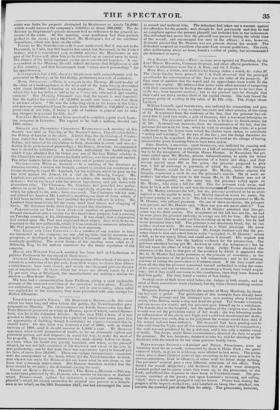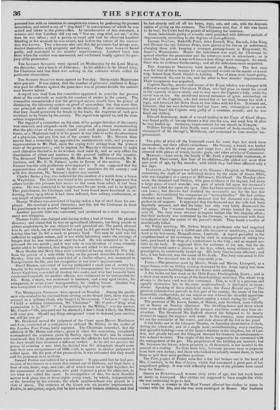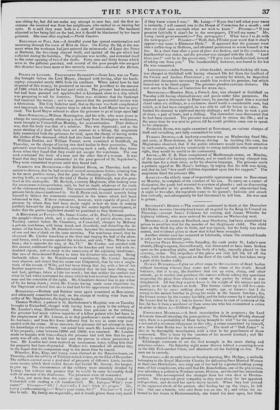WESTMINSTER SESSIONS.—Lambert and Prince, Frenchmen, were on Saturday tried for
an assault, committed by them in Hyde Park ; the parti- culars of which, as given in evidence, were alluded to last week. The prose- cutor, who isabout eighteen years cf age, according to his own account in his cross-examination, lived in idleness, or rather with his father doing nothing. The prisoners' counsel gave a very different statement of the affair. They denied the assault altogether ; and declared, that as they were strangers, Lambert pulled out his purse when they came up to the prosecutor, in the Park, and offered hint sixpence to show them to Titchfield-street. The pro- secutor snatched at the purse; and upon Lambert's resisting, and calling "thief," drew a knife and plunged it into his breast. Prince had, durints' the progress of the inquiry, walked on ; and Lambert on being thus attacked, ran towards the crowded part of the Park for safety. The prosecutor, however, pursued him with an intention to complete his crimes, by preferring the present accusation, and raised a cry of" stop thief!" in consequence of which he was seized and taken to the police-office. In corroboration of this statement, a witness said that Lambert did cry out, " Not me, stop thief, not me," at the time he was taken ; and a person in court said that he observed Lambert bleeding at the moment he was seized, and before the nature of the accusa- tion was known. Two witnesses also said that the prisoners had always con- ducted themselves with propriety and decency. They were howeer found guilty, and sentenced to six months' imprisonment. Lambert burst into tears when the verdict was announced, and exclaimed loudly against the per- jury of the prosecutor.
THE LONDON SESSIONS were opened on Wednesday by the Lord Mayor, the Recorder, and a bench of Aldermen. In his address to the Grand Jury, the Chairman said that there was nothing in the calendar which called for particular observation.
THE SURREY SESSIONS were opened on Tuesday. Thirty-eight Magistrates were present. It was stated, that the number of prisoners confined in King- ston gaol for offences against the game-laws was at present double the number ever known before.
A report was read from the committee appointed to consider the present state of the coal-trade as regards the conduct of meters in the county. The committee recommended that the principal meters should have the power of dismissing the labouring meters on proof of misconduct, but that more than one principal meter should concur in the dismissal. It also recommended that they should prosecute for frauds in the trade, the expenses of such pro- secutions to be borne by the county. The report was agreed to, and the com- mittee reappointed.
The report of a committee on the state of the pauper lunatics of the county was received, and adopted—with the exception of a clause recommending that the physician of the county should visit each pauper lunatic at stated times, as a Magistrate had it in his power at any time to order the attendance of a physician, and pay him out of the county funds. Mr. Briscoe then moved that a committee be appointed to communicate with, and prepare a representation to Mr. Peel, upon the crying evils arising from the present state of the game-laws ; and to implore his Majesty's Government to make such alteration thereof as to its wisdom shall seem fit, and as may effect the diminution of crime and conduce to the general welfare of the country. The Reverend Thomas Courtenay, Mr. Denison, Mr. H. Drummond, Mr. R. Jackson, and Mr. C. N. Palmer, spoke in favour of the motion. Mr. H. Sumner was the only gentleman who opposed it. It was suggested that the representation should be made by the two members for the county; and with this alteration, Mr. Briscoe's motion was carried.
Charles Burke a boy, was indicted for the stealing of a watch from a house at Weybridge. The watch was found in his possession; but it appeared that others besides the prisoner had access to the room from which it had been stolen. He was sentenced to be imprisoned for one week, and to be flogged. This punishment, the Chairman said, had been found more beneficial in re- formiug those upop whom it had been inflicted, than solitary confinement, or any length of imprisonment.
George Wallace was convicted of having stolen a bar of steel from his em- ployer. He received a good character; and this led the Chairman to limit his punishment to six months' imprisonment.
Another juvenile thief was convicted, and sentenced to a short imprison- ment and whipping.
Thomas Curtis was charged with having stolen a loaf of bread. He pleaded distress; and stated that he was an agricultural labourer, but being unable to obtain employment, he was obliged to seek parochial aid. The parish allowed him 4s. per week, out of which he had to pay Is. Gi/. per week for his lodgings, leaving hint but 2s. 6d. a week to procure food. This sum he said was not sufficient to support nature, and it was while labouring under the craving; of hunger that he was induced to steal the loaf. He was sentenced to be im- prisoned for one month ; and it was only in consideration of sonic infirmity under which he laboured, that flogging was not added to his sentence.
Mary Henley and Mary Shea were convicted of having stolen 1/. 16s. 6d. from the person of a man while lying on the ground insensible from drink. Henley, who was formerly convicted of a similar offence, was sentenced to Transportation for life, and her companion to one year's imprisonment.
David Mutton, convicted of having embezzled a small sum of money be- longing to his employer, was sentenced to transportation for fourteen years. James Eggleton, convicted of stealing two coats, and wino had formerly been condemned capitally for another offence, was sentenced to he transported for fife. King, a negro, was sentenced to fourteen, and a boy aged twelve, his compauion, to seven years' transportation, for stealing bacon. Another boy was transported for seven years; for stealing eight silver spoons.
THE MIDDLESEX Sussioris were opened on Monday. Among the gentle- men who wished to be excused from serving on the Grand Jury, there was one
arrayed in a military cloak, who begged to be excused, "because," says he, "I hold a military commission, Mr. Chairman." Mr. Const—" Pray what commission is it, Sir ?" " A lieutenancy in the Militia," was fine answer. Mr. Const—" Oh, you need not be alarmed ; I don't think it likely the Militia will want you. Should any thing unexpected occur to demand your service, Nve will let you go."
Mr. Broderick moved the judgment of tine Court upon Messrs. North ouse and Low, convicted of a conspiracy to defraud Mr. Baldey in the matter of the London Free Press, lately reported. The Chairman remarked, that the affidavit of Mr. Hume and others, given in since the conviction, completely contradicted the evidence given by Baldey upon the trial ; and he seemed convinced, that if the gentlemen who swore the affidavits had been examined, the Jury would have returned a different verdict. As he did not possess the power of ordering a new trial, he decided that the defendants should miter into their own recognizances of 100/. each, to appear to receive judgment if called upon. On the part of the prosecution, it was intimated that they would call for judgment next sessions. Samuel Probin was indicted for a nuisance. It appeared that he had pos- session of two houses in a court that tarried out of Holborn, and kept there a host of rats, bears, dogs, and cats, all of which were set to fight together, for the amusement of an audience, who paid sixpence a piece for admission, to sec what was called the sport. Inn consequence of this, the most dreadful uproar took place two or three nights every week, by which, independently of the brutality to the animals, the whole neighbourhood was placed in a state of alarm. The sentence of the Court was six months' imprisonment. Probin, in mitigation, urged, that be had a wife and sixteen children, and that he had already sold off all his bears, dogs, rats, and cats, with the determi- nation of giving up the concern. The Chairman said, that if this was found to be true, the Court had the power of mitigating the sentence. Some individuals guilty of assaults were punished with different periods of imprisonment, according to the degrees of theirssffences.
George Denham, Radcliffe Pond, John Russell, Wm. Russell, John King, and Thomas George Johnson Pears, were placed at tine bar on an indictment, charging them with keeping a common gaming-house in King-street, St. James's, Westminster. Before the indictment was read, the Chairman in- quired whether the prosecutor and his witnesses were in attendance ; as in cases like the present it was well known how thing:s were managed. As usual, there was no evidence forthcoming; and all the defendants were acquitted.
THE ADMIRALTY SESSIONS were opened on Monday. The first case was the trial of three seamen for an aggravated assault on the master of a coal- brig, bound from North Shields to London. Two of them were found guilty, arid sentenced, the one to six, and the other to four months' imprisonment. Their companion was acquitted.
Captain Barclay, master and owner of the Essex whaler, was charged with different assaults upon Christiania Walker, who had gone on board tine vessel in the capacity of nurse-maid, and to wait upon the Captain's lady, while the vessel was at sea. She mentioned several instances of gross misconduct on the part of the Captain, who had stinted her of her food, beaten her with a rope, and knocked her down three or four times with his fists. It turned out, however, that her own behaviour had not been very circumspect or moral. The Jury found the Captain only guilty of a common assault ; and he was fined one shilling. -
Edward Armstrong, mate of a vessel trading to the Cape of Good Hope, was found guilty of having thrown a boy into the sea, and used him ill after he was hauled up. Sentence, imprisuritnent for one month in Newgate. William Barrup and John North, were convicted Of body-stealing, hi the churchyard of St. George's, Middlesex, and sentenced to nine months' ins- prisoument.
The gales of wind off the Yarmouth coast for some days last week were tremendous, and their effects calamitous. On Sunday, a wreck was hauled on shore—the whole of the crew and cargo lost ; and the coast absolutely strewed with pieces of wreck, besides grain, and other articles of Commerce.
MEASLES.—Last week, the family of Mr. Judd, a respectable tradesman, at Bell-yard, Fleet-street, lost four of his children—the eldest not more than nine years of age, by the measles, with which they had been afflicted only a few days.
INoussrs,—An inquest was held at St. Thomas's Hospital, on Wednesday, concerning the death of an individual known by the name of James Allen, who was employed as a sawyer at Mill-street, Dockhead. On Monday after- noon, the deceased and Shricve, who gave evidence at fine inquest, had sawn a large piece of wood asunder, one part of which fell upon the deceased's head, and killed her upon the spot. Allen had been married for about twenty- one years ; but Shricve had doubted the deceased's sex for the last few months : he considered his companion an "hermaphrodite." She had neither whiskers nor beard. The surgeon declared that the deceased was a female, perfect in all respects. It appeared that the deceased and her wife had been regularly married, and that the latter had only very lately discovered the deception. The " woman husband," it seems, always treated the woman very ilL The Jury were anxious to inquire further into this singular affair ; but their curiosity was restrained by the Coroner, as inconsistent with their investigation into the cause of the person's deaths'. They found a verdict of accidentally killed.
On Friday morning, Mr. Joshua Mayne, a gentleman who had acquired considerable celebrity as a skilful and able inventor of machinery, was found dead in his bed-room, Roupell-street, Lambeth. A report prevailed in the
neighbourhood of his residence, that he died in consequence of eating two tarts, purchased at the shop of a confectioner in the City ; and an inquest was
held on the body. It appeared from the evidence of his son, that tine de- ceased laboured -under a disease ins his legs, which, being addicted to self- prescription, he unadvisedly healed up. His moody then became affected; and this, it was believed, was the cause of his death. The Jury concurred in this opinion. The deceased was in his sixty-ninth year. FIRES.—The premises used by Messrs. Webb and Martin, Liverpool, as a sugar-house, were on Friday evening destroyed by fire. Some injury was done to the contiguous buildings before the flames were subdued. A fire broke out last week at the Hole Farm, Finchingfield, Essex ; and in a short time scarcely a.vestige of the farm-buildings remained. The whole crop of corn in the barn yard was also consumed. This, as well as a previous and equally destructive fire in the same neighbourhood, is attributed to incen- diaries. Speaking of these diabolical deeds, the Essex Herald says—" The greatest consternation prevails in that part of tine county, the scene of the late lamentable conflagration, no one retires to rest without the dreadful apprehen- sion of a similar affliction, many, indeed employ a watch during the night." The premises of Mr. Lowe, farmer, of Binton, near Stratford', were wilfully set in flames on Sunday afternoon. The dwellingshouse and three wheat ricks were all the property which the greatest exertions could save from de- struction. The Reverend Mr. Rufford allowed his fishpond to be nearly drained to supply the engines with water. Inn the evening, some miscreants let out the remainder of the water, and stole almost all the fish in tine pond. A fire broke out in the Glasgow Theatre, on Saturday about twelve o'clock, during the rehearsal; and in a single hour, notwithstanding every exertion, that splendid building—one of the largest theatres in the kingdom, out of Lon- don, and greatly beyond the Glasg-ow demand for dramatic entertainments—
was reduced to ruins. The origin of the fire is supposed to be connected with the management of the gas. The proprietors of the building are insured ; hut Mr. Seymour the lessee, whose property is all destroyed, is not insured to the amount of a shilling. No lives were lost; but some persons were in jeopardy froin their own daring; and those who looked on actually stoned them, to force them to quit their most perilous position. The Paris papers of Friday state that a fire had broken out in the hotel of Mrs. Crawford, inn the Rue d'Anjou, which had consumed a great part of her magnificent gallery. It was with difficulty that any of the pictures were saved from the flames.
DEATH BY BURNING.....-A woman sixty years of age, was last week burnt to death in Liverpool. Her clothes are supposed to have caught fire while she was undressing to go to bed.
Last week, a woman in the Meal \rennet allowed her clothes to come in contact with the fire, and she was soon enveloped in flames. Her husband
was sitting by, but did not make any attempt to save her, and the first as- sistance she received was from her neighbours, who rushed in on hearing her cries. It is said they were both in a state of intoxication. The husband objected to her being laid on the bed, lest it should be blackened by her burnt garment. She soon after expired.—Perth Courier.
EXPLOSION OF FOUL Ant.—A dreadful event has spread consternation and mourning through the town of Rive de Gier. On Friday the 2, at the mo- ment when the workmen had just entered the mine-works of Logic des Peres at Martoret, the fire-damp shoued itself, and ignited all the gas which had collected during the holidays. The explosion was terrific, and extended itself to the outer opening of two of the shafts. Forty men and thirty horses which were in the galleries perished, and several of the poor people who escaped this disaster have been more or less severely Wounded.—Journal des Debuts.




















 Previous page
Previous page